BCWF Watershed Team 2023 Summary
The BCWF Watershed team, which includes the Wetlands Education Program (WEP), Wetlands Workforce (WW), and Fish Habitat Restoration and Education Program (FHREP), made great strides in 2023 to further conservation efforts across British Columbia. Our restoration and education collaborations included partnerships with over 30 First Nations and engaged with more than 40 communities.
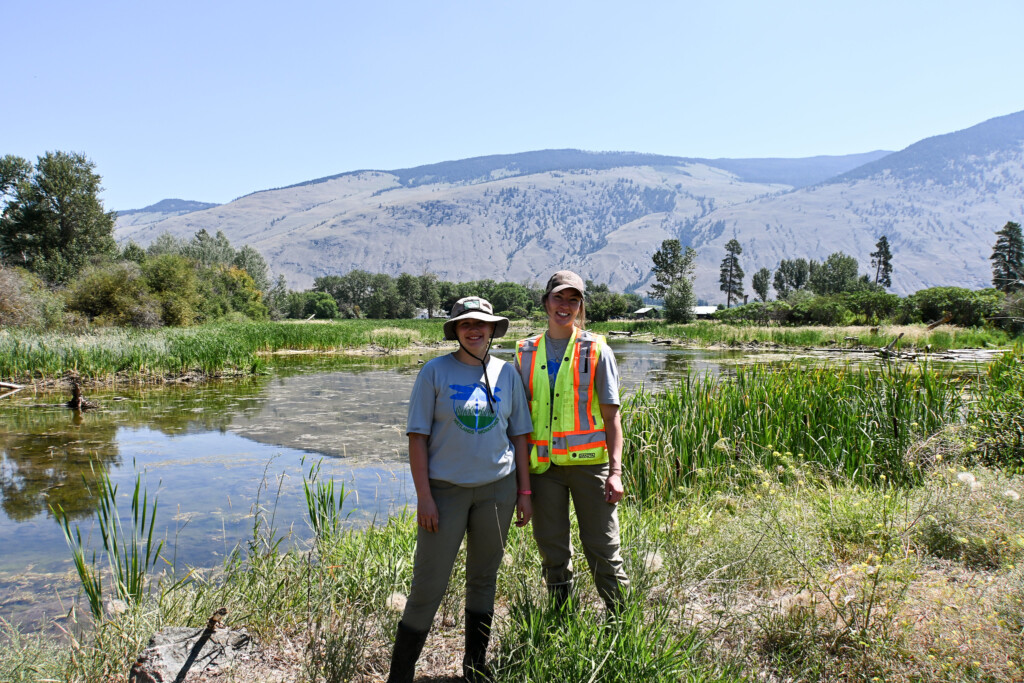
Maintenance and Monitoring
Wetland maintenance and monitoring was a major focus of the BCWF Watershed team throughout 2023, assessing the effectiveness of wetland restoration and enhancement projects. Gathering information on the effectiveness of past restoration sites helps us better understand our impact and investments, and improves future projects. In addition to gathering information on hydrologic parameters, our staff were involved in monitoring past restoration sites for use by wildlife including waterfowl, amphibians, and other targeted species. As part of a restoration project’s commissioning phase, field crews also provided these sites with additional invasive species control, exclusion fencing, and planting of native vegetation. Twenty-three sites were supported by three field crews.
New Conservation Tools – leading the way
Conservation relies on high-quality information. The BC Wildlife Federation is leading the development of new conservation decision making tools such as the Wetland Ecosystem Services Protocol (WESP) and supporting the development of the Canadian National Wetland Inventory (CNWI).
The Wetland Ecosystem Services Protocol is a standardized tool for assessing the function and value of wetland services. Once developed, it allows for comparative assessments of wetlands to target conservation and restoration efforts more effectively. In 2023, the team successfully collected 96 additional WESP calibration sites from the field to help finish calibrating the WESP tool in four eco-provinces (i.e., the Georgia Depression, Southern Interior Mountains, Taiga, Sub-Boreal Interior, and Boreal Plains). Each region requires a minimum of 100 sites to be calibrated, so this has been a multi-year effort. In addition, over 100 field plots were collected for the CNWI. The field plots help support a nation wide initiative led by Environment and Climate Change Canada to compile a more comprehensive wetland inventory and utilize machine learning to improve mapping products for identifying the extent and location of wetlands. The field sites collected help improve the CNWI mapping products by training artificial intelligence to identify and validate wetlands from field-based observation. Collaboration with Indigenous Bands and Nations, as well as provincial government bodies, emphasizes the importance of these assessments and ensures their integration into environmental practices. Over 50 individuals were trained in WESP and CNWI assessments across the province.
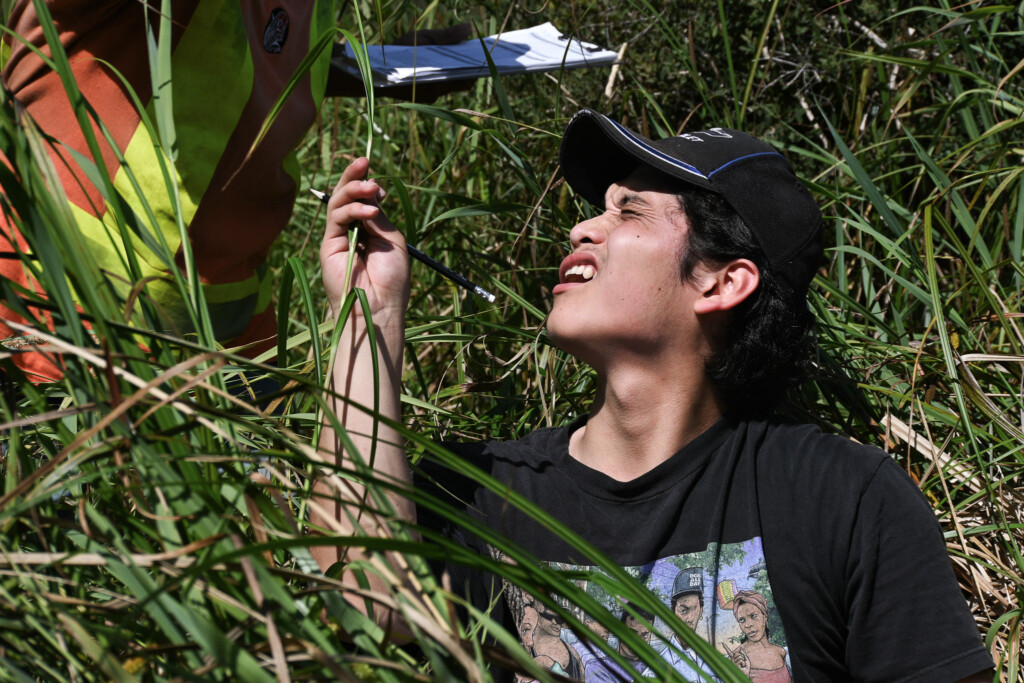
Restoration and Enhancement
Through wetland restoration, invasive species management, planting and seeding of native plants, and shoreline cleanups the Watershed team provided restoration and enhancement to over 240 hectares across the province. The Fish Habitat Restoration team expanded its aquatic restoration program throughout B.C.in 2023, which included two stream restoration projects in the Bonaparte and Coldwater watersheds.
In collaboration with BCIT Masters of Ecological Restoration students, the BCWF constructed the first of 100 Beaver Dam Analogues – human-made structures mimicking natural beaver dams – and assessed over 60 sites for additional dams. These are part of the ‘Water, Water Everywhere’ Project, aiming for province-wide installation over the next two years. Beaver dams naturally hold water on the landscape and provide a low-cost, natural solution to wetland restoration.
Additionally, the BCWF participated in the rehabilitation and release of several beavers back into the wild in 2023 in collaboration with First Nations, the Interior Wildlife Rehabilitation Society, and Tom Willms from the Nicola Valley Institute of Technology.
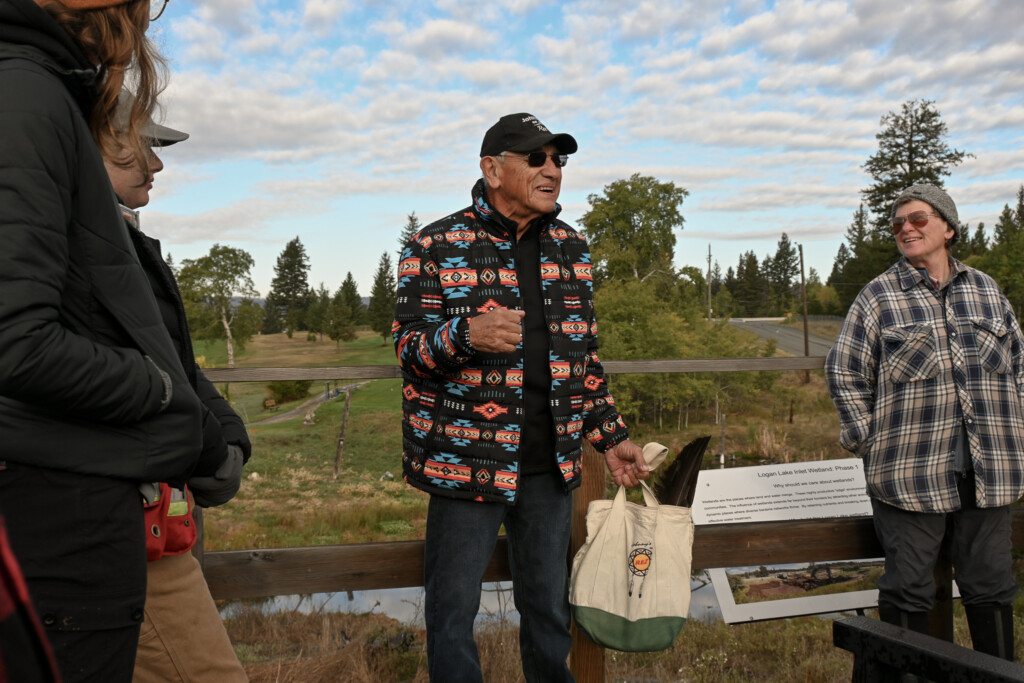
Education and Outreach
A cornerstone of the Watershed team’s mission is to advocate and engage with the public on the value of wetland and fish habitat conservation. The BCWF hosted 33 workshops and 38 outreach events in 2023, engaging with over 520 program participants and over 3,500 members of the public.
The BCWF’s Wetlands Education Program (WEP) trains local wetland steward by offering educational workshops, from webinars to intensive multi-day sessions, aimed at educating communities to undertake their own wetland conservation and enhancement projects. The Federation’s Fish Habitat Restoration and Education Program (FHREP) also hosted a range of educational workshops ranging from 1-2 days to enable communities to learn about, steward and implement their skills for improving fish habitat.
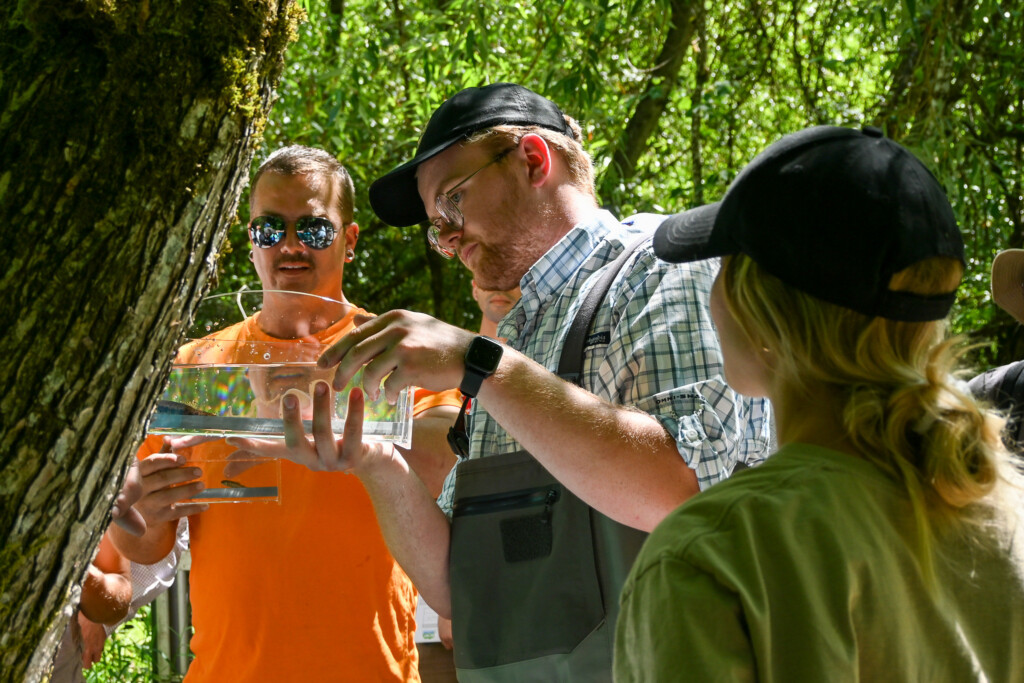
A highlight of 2023 was the Wetlands Institute, an intensive week-long workshop conducted in Barriere, Clearwater, and Kamloops, which trained over 15 participants on in-depth wetland restoration practices.
Participants and attendees of our education programs included environmental consultants, stewardship groups, First Nations technicians and band members, government employees at all levels, landowners, and community members who were interested in making a difference in their local wetland.
The BCWF’s Watershed team enhanced youth education by collaborating with the Youth team. Activities included a multi-day Conservation Training Camp with the Shuswap Nation and the Go Wild overnight youth camp. At the Shuswap Youth Camp, participants engaged in workshops that integrated scientific knowledge with traditional cultural practices. Both programs covered various topics such as plant and wetland sessions, wetland identification, fish and lake stewardship, and wildlife identification, ensuring a comprehensive educational experience.
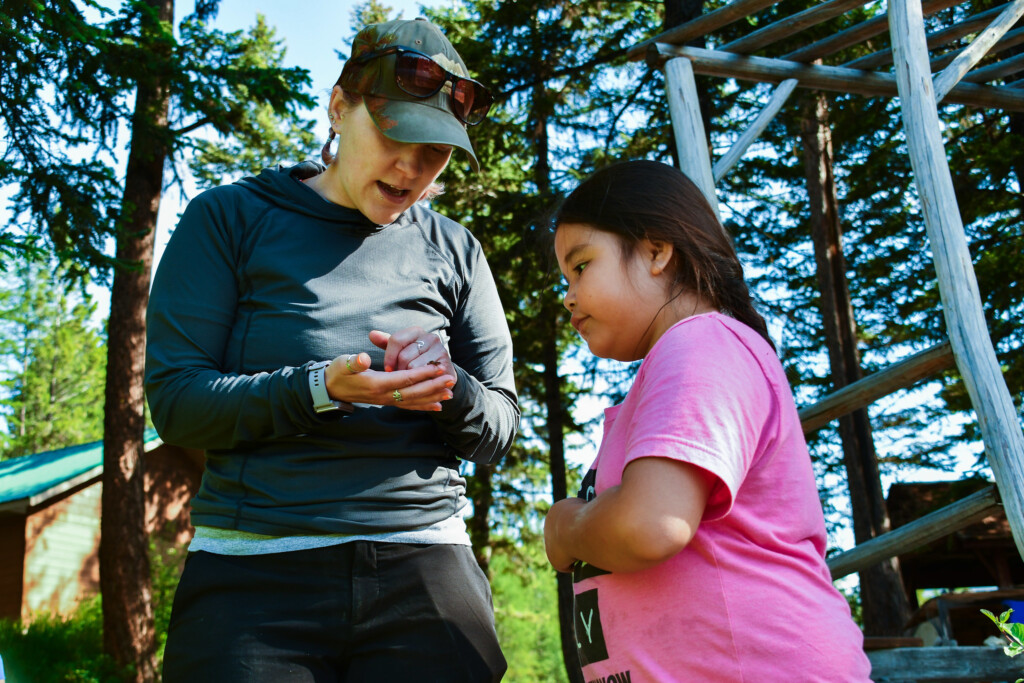
Furthermore, in alignment with BCWF’s overarching dedication to outdoor access, the Watershed team’s Outdoor Access Improvement Project continued in 2023. This initiative successfully enhanced the accessibility of over 15 lakes and outdoor spaces, making them wheelchair-accessible in total.
Conservation Illustrations
Our Conservation Illustrator, Chenoa Gao, published her graphic novel, “We Are of Water” this year. The novel provides visuals connected to voices and knowledge shared by Indigenous Elders, youth, and community members through Healthy Watershed Initiative projects, emphasizing the significance of watersheds and water. Chenoa presented her work to over 500 students across the Lower Mainland.
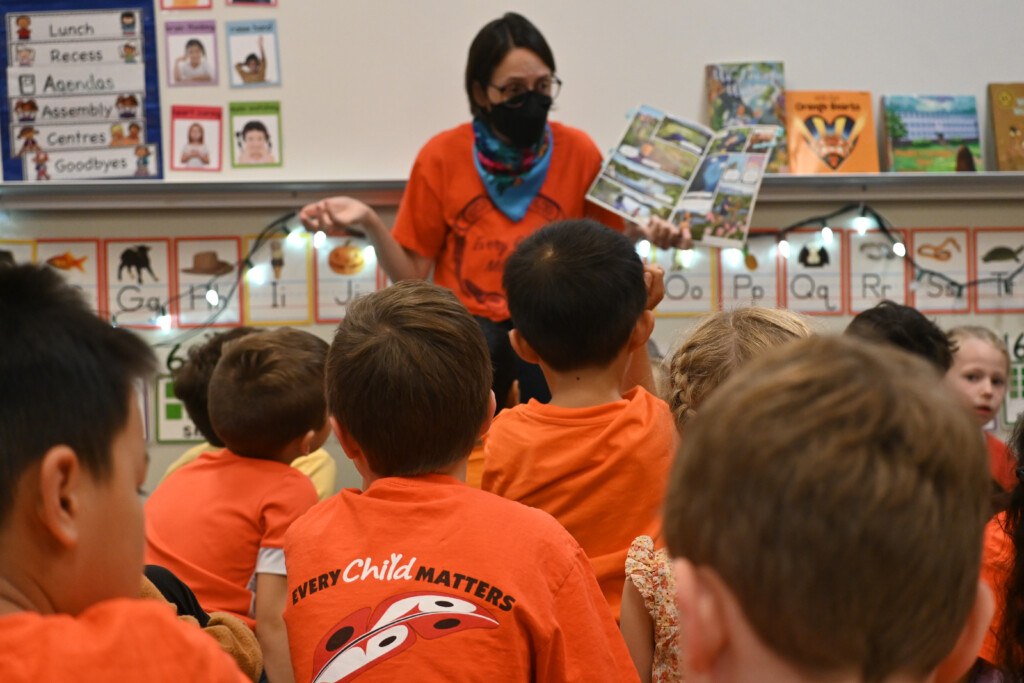
In conclusion, 2023 marked a year of dynamic growth and success for the BCWF Watershed team, significantly advancing environmental restoration and community engagement throughout British Columbia. This progress would not have been possible without the invaluable support and collaboration of our project partners and funders.
As a team, we would like to extend our heartfelt gratitude to the following funders:
Province of British Columbia, Government of Canada, Disability Alliance of BC, Pacific Salmon Foundation, Columbia Valley Community Foundation, Columbia Valley Local Conservation Fund, Environment and Climate Change Canada, Bass Pro Shops and Cabela’s Outdoor Fund, Fish and Wildlife Compensation Program, New Horizons, Fresh Water Fisheries Society of British Columbia, Wildlife Habitat Canada, iA, Multiculturalism, Habitat Conservation Trust Foundation, Telus, BC Conservation and Biodiversity Award, Department of Fisheries and Oceans BC Salmon Restoration Innovation Fund, ECO Canada, McLean Foundation, G+F Financial Group, Clean Foundation, Community Services Recovery Fund, BC Interior Community Foundation, and all others who have contributed to our efforts. Your support has been instrumental in helping us achieve our conservation goals and has enabled impactful changes in the communities we serve.
This article was written by:
Jamie Long, Conservation Stewardship Communications Coordinator, B.C. Wildlife Federation
